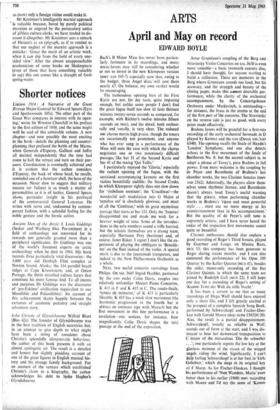Shorter notices
Liaison 1914: A Narrative of the Great Retreat Major-General Sir Edward Spears (Eyre and Spottiswoode 105s). 'No other part of the Great War compares in interest with its open- ing,' wrote Sir Winston Churchill in his preface to the first edition of 1930, and the same might well be said of this admirable volume. A new chapter—and now possibly the most exciting in the book—details the planning and counter- planning that prefaced the battle of the Marne, when Generals d'Esperey, Gallieni and Joffre all decided independently that the time had come to halt the retreat and turn on their pur- suers. Coordination is eventually achieved and it is evident that the author considers d'Esperey, the back of whose head, he recalls, reminded one of a howitzer shell, the hero of the occasion. Never slow to suggest that military success (or failure) is as much a matter of personalities as it is of tactics, General Spears shows particular insight in his portrayal of the controversial General Lanrezac. He writes with verve and, undaunted by contem- porary fashion, with a splendid feeling for the noble gesture and the heroic action.
Ancient Men of the Arctic J. Louis Giddings (Seeker and Warburg 84s). Pre-eminent in a field of archaeology not renowned for its rewards nor generally granted more than a peripheral significance, Dr Giddings was one of the world's foremost experts on arctic archaeology when he died in 1964. His book records three particularly vital discoveries: the 5,000 year old Denbigh Flint complex at Norton Sound, Alaska; the 114 parallel beach ridges at Cape Krusenstern; and, at Onion Portage, the thirty stratified culture layers that constitute his most famous find. To all intents and purposes Dr Giddings was the discoverer of 'pre-Eskimo' civilisation (equivalent to our Mesolithic and Palaeolithic): his account of this achievement skates happily between the extremes of academic pedantry and straight adventure story.
John Christie of Glyndebourne Wilfrid Blunt (Bles 42s). The founder of Glyndebourne was in the best tradition of English eccentrics but, in an attempt to give depth to what might have been a string of anecdotes about Christie's splendidly idiosyncratic behaviour, the author of this book presents it with an almost apologetic air. The result is a detailed and honest but slightly plodding account of one of the great figures in English musical his- tory and his strange family background. For an account of the venture which established Christie's claim to a biography, the author acknowledges his debt to Spike Hughes's Glyndebourne.






































 Previous page
Previous page